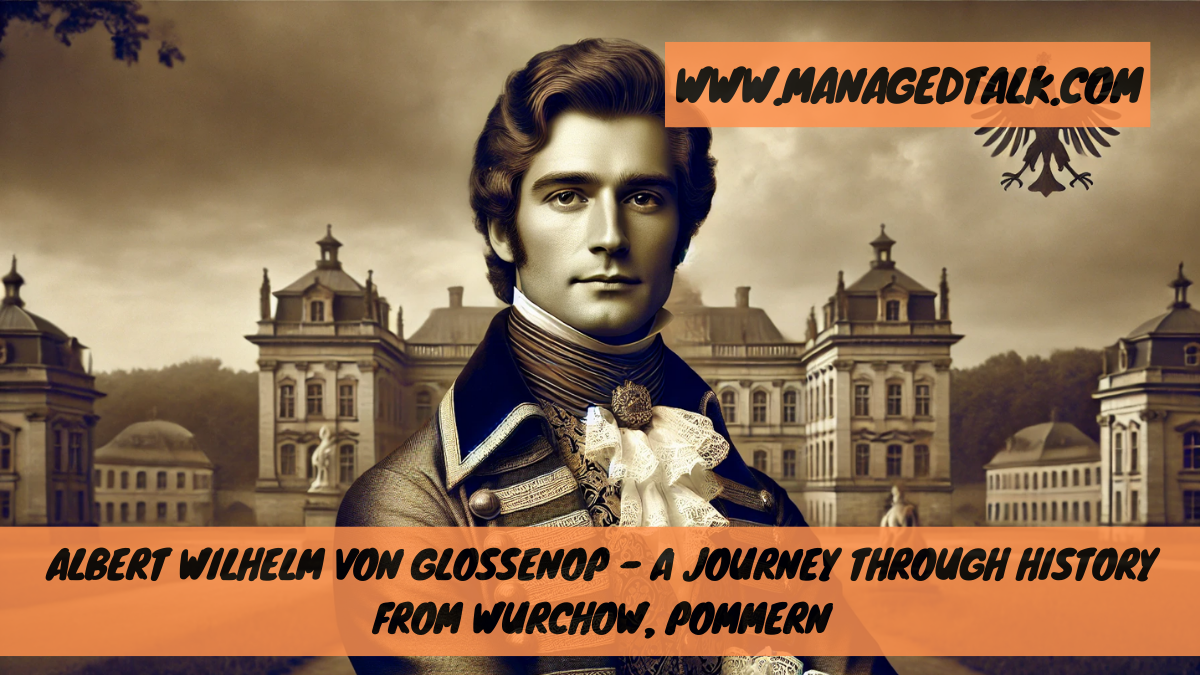Introduction to Albert Wilhelm von Glossenop
Albert Wilhelm von Glossenop, born in Wurchow, Pommern, stands as a significant historical figure whose life and lineage reflect the unique cultural and social landscape of 19th-century Europe.
Albert Wilhelm von Glossenop, born in Wurchow, Pommern, represents the nobility’s legacy, with his life offering insights into 19th-century German aristocracy, local governance, and regional history.
This article delves into the history, heritage, and contributions of von Glossenop, examining his background, his era’s historical context, and his impact on his descendants and region. By understanding von Glossenop’s journey, readers gain insight into the lives and legacies of German noble families from Pommern, Germany.
Background: Who Was Albert Wilhelm von Glossenop?
Albert Wilhelm von Glossenop was a German nobleman born in Wurchow, Pommern, whose life story illustrates the rich heritage of Prussian nobility. He was likely born in the early to mid-19th century during a period of great change and cultural preservation within the German states. Understanding his role and background sheds light on the aristocratic traditions that influenced the broader European social fabric.
The Legacy of Pommern Nobility and Its Influence on Europe
The region of Pommern (Pomerania), situated along the Baltic coast, was home to a distinct group of nobles whose heritage influenced Central and Eastern Europe. The von Glossenop family was part of this aristocracy, known for its land ownership, military contributions, and cultural influence. Examining this noble class’s legacy offers valuable insights into European nobility’s customs, values, and contributions.
Life in Wurchow, Pommern: A Snapshot of Albert’s Homeland
Wurchow, now known as Wierzchowo in modern Poland, was a part of Pommern that carried both strategic and cultural significance. Albert’s birthplace influenced his upbringing, social connections, and potentially his role within the local aristocracy. This section will explore the town’s history, geographical features, and its cultural atmosphere in Albert’s era.
Family Heritage and Historical Significance of the Glossenop Lineage
Albert Wilhelm von Glossenop belonged to a lineage that exemplified the German nobility’s values, including family loyalty, land stewardship, and local governance. This lineage analysis will explore his family’s historical records, connections to other noble families, and their role in regional administration.
Albert Wilhelm von Glossenop’s Life Journey and Contributions
This section delves into Albert’s personal journey, including possible roles he played in Pommern society. Was he involved in land management, military service, or cultural patronage? By analyzing records and interpreting the social norms of his time, we provide a speculative but informed look at his life.
The Cultural and Political Landscape of 19th-Century Pommern
During Albert’s time, Pommern was undergoing significant changes as part of the Prussian state and, later, the German Empire. This period was marked by industrialization, military developments, and cultural movements. Understanding this backdrop contextualizes Albert’s role and possible challenges in a transforming society.
Descendants and Influence of Albert Wilhelm von Glossenop
Albert Wilhelm von Glossenop’s influence likely extended through his descendants, contributing to Pommern’s legacy. This section will explore how noble descendants adapted to changing times, including shifts in political structures, economic pressures, and cultural transformations in 20th-century Germany and beyond.
FAQs About Albert Wilhelm von Glossenop and Wurchow Pommern
Q1: Who was Albert Wilhelm von Glossenop?
Albert Wilhelm von Glossenop was a nobleman born in Wurchow, Pommern, whose life symbolized the heritage and responsibilities of 19th-century German aristocracy.
Q2: Where is Wurchow, Pommern, located today?
Wurchow, now Wierzchowo, is a village in modern Poland that was historically part of Pomerania (Pommern) in Prussia.
Q3: What influence did Albert Wilhelm von Glossenop have on his community?
While specific details are limited, von Glossenop likely played a role in local land management and upheld family traditions within the noble class.
Q4: What was Pommern’s role in the German Empire?
Pommern was a significant part of Prussia, influencing Germany’s military, agricultural, and cultural developments.
Q5: Are there still descendants of the von Glossenop family?
Some descendants may still exist, though records may be sparse due to social and political changes in the 20th century.
